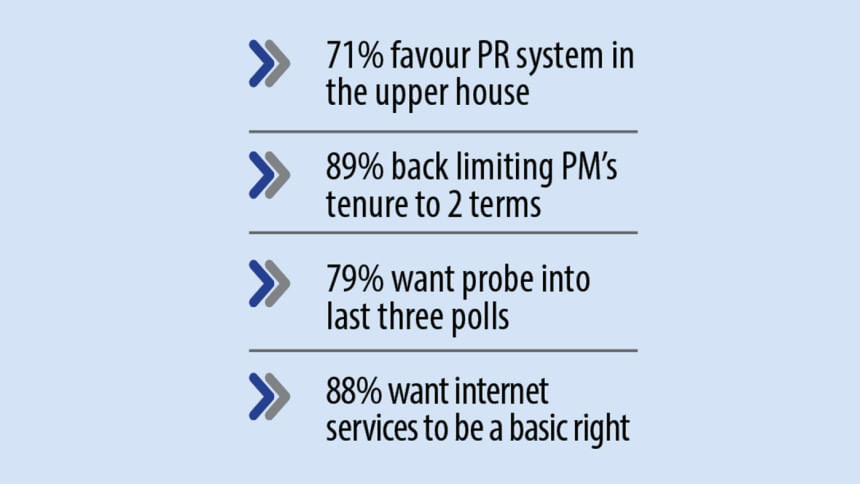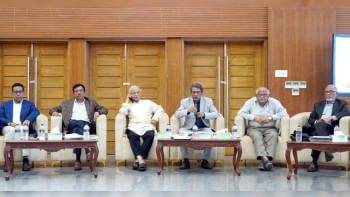83% in favour of caretaker govt system

Eighty-three percent of people are in favour of forming an election-time caretaker government for 120 days during the national polls.
They want a provision for the caretaker government system in the constitution. Moreover, 79 percent want irregularities and fraud in the last three general elections to be investigated and those responsible to be held accountable.
These findings come from a public opinion survey conducted as part of the process to finalise the National Charter proposed by Shushashoner Jonno Nagorik (Shujan), a civil society platform.
Ekram Hossain, a member of Shujan's national committee, presented the survey results at a press briefing at the Dhaka Reporters Unity yesterday.
The survey, conducted between May and July this year, gathered responses to 40 questions from 1,373 people across the country, in addition to feedback from 15 citizen dialogues. Of the respondents, 335 were women, 1,033 men, and five were from the third gender.
When asked whether the current government is neutral, Shujan Secretary Badiul Alam Majumdar said, "This government does not represent any political party. It is a non-partisan government."
According to the survey, 69 percent support a bicameral legislature, while 63 percent favour rotating reserved seats for women in the lower house, and 69 percent want 30 reserved seats for women in the upper house.
Seventy-one percent favour proportional representation (PR) system in the upper house, 86 percent want the deputy speaker of the House to be appointed from the opposition, and 82 percent want the deputy speaker of the upper house to be from the opposition as well.
Eighty-seven percent support a provision barring the same individual from holding the posts of prime minister, leader of the house, and party chief simultaneously.
Eighty-nine percent favour limiting the prime minister's tenure to a maximum of two terms. Eighty-seven percent support a cabinet-led government, while 88 percent favour increasing the power of the president.
Eighty-seven percent want article 70 of the constitution to be amended, and 90 percent support governing the state based on the principles outlined in Tajuddin Ahmad's declaration of April 10, 1971.
Eighty-eight percent of respondents believe internet services should be recognised as a basic right, alongside food, education, healthcare, and housing.
Eighty percent support the creation of a National Constitutional Council. Ninety percent want the Anti-Corruption Commission, Human Rights Commission, Information Commission, and the proposed Local Government Commission to be made constitutional bodies.
Eighty-seven percent support requiring approval from the Election Commission for any executive actions during the polls period that could influence the elections.
Eighty-four percent want an independent delimitation commission of experts formed after every census. Eighty-eight percent back cancellation of candidacy or results of any candidate who provides false information on election expenses.
Ninety-two percent want individuals identified as criminals, extortionists, corrupt figures, or convicts to be declared ineligible for political parties.
Eighty-seven percent support using passport data to enable postal or online voting for expatriates. Eighty-eight percent back creating a national voter registration authority, 83 percent support a "no" vote option, and 90 percent want a permanent independent police commission.
Talking about the findings, Shujan Secretary Badiul Alam said the survey clearly proved that citizens are in favour of reforms and want a change.
He added that the existing systems, processes, and institutions have enabled Sheikh Hasina to become an autocrat and so changes are a must.
"If we are to establish a democratic state, we need a complete overhaul of these systems, processes, and institutions. Reforms are necessary," he said.
Speaking at the event, Robaet Ferdous, professor at Dhaka University, said, "Elections alone do not guarantee good governance."
Citing examples such as money laundering and corruption during past governments, he stressed the need for reforms within political parties.
Highlighting the Shujan's proposed National Charter, the speakers at the press conference opined that this charter would help build a democratic, humane, and prosperous Bangladesh if implemented.

 For all latest news, follow The Daily Star's Google News channel.
For all latest news, follow The Daily Star's Google News channel. 



Comments